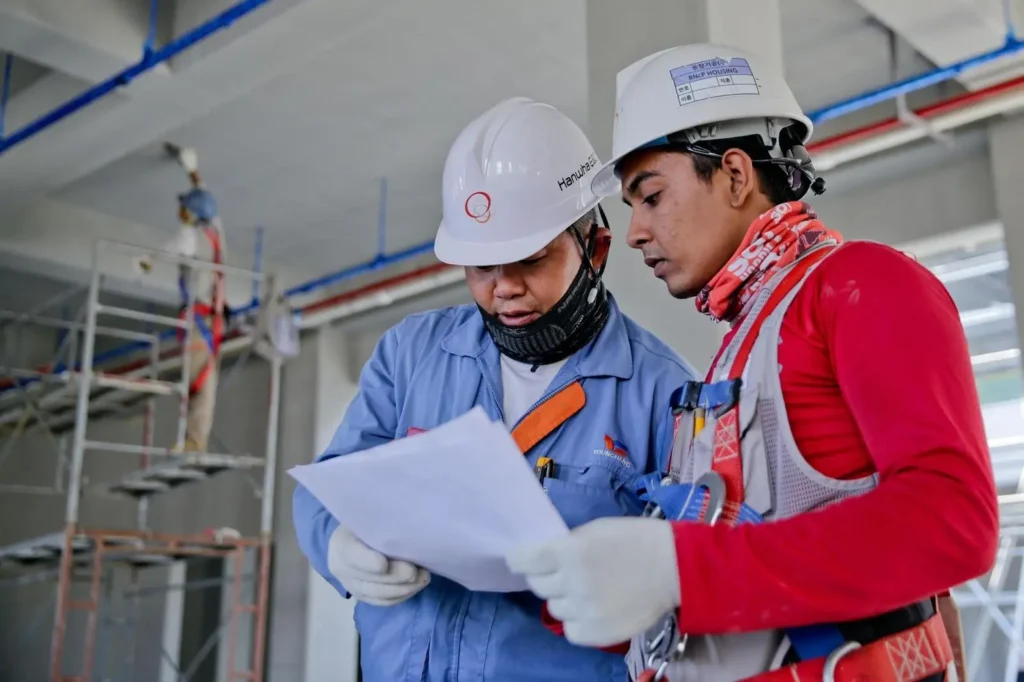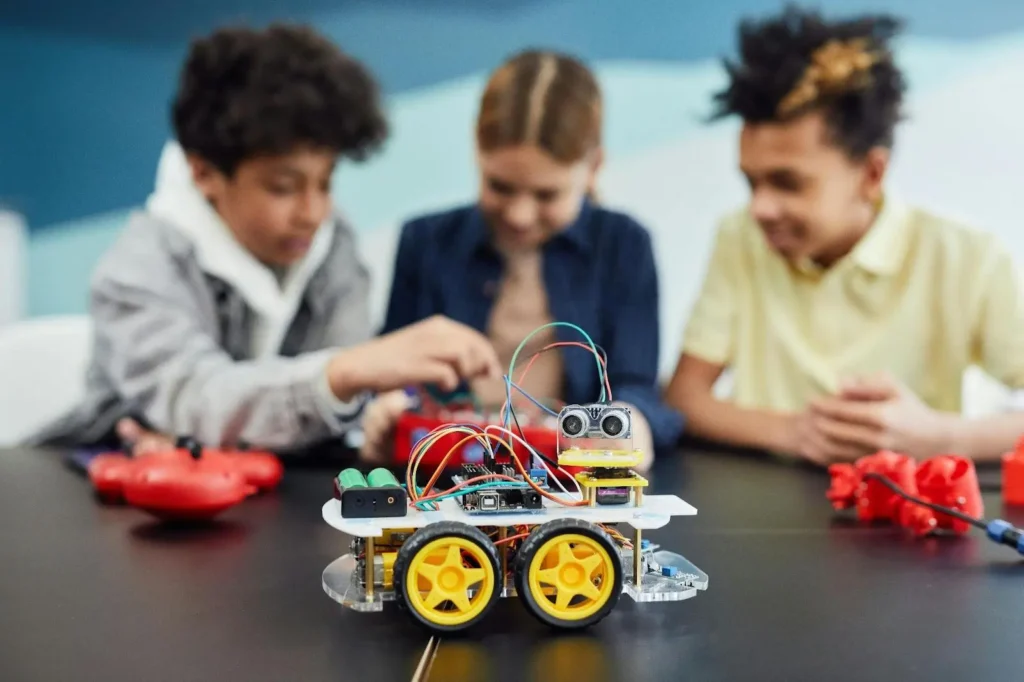AI is changing how the automotive industry works; on the factory floor and in logistics. What was once a mechanical process is now becoming intelligent and more cost-efficient than ever before. Today’s car factories look very different from those of just a decade ago. Now, smart robots work alongside humans and computers make split-second decisions that keep production lines running smoothly.
In this piece, we explore how manufacturers are using AI to gain a competitive edge across their operations.
AI for the Automotive Industry: Transforming Traditional Assembly Lines
Traditional assembly lines are being replaced by adaptive systems that learn and improve over time. AI-enabled robots can detect defects and adjust parameters in real-time thereby reducing downtime and making the production process more agile and reliable.
While human workers are still essential, AI for the automotive industry has changed the game entirely. Today’s automated, or “smart” plants now have tech systems that can not only repeat one action as programmed, but learn and adapt as they go. AI in automotive manufacturing
Practically, this means faster decision-making, fewer errors and overall smarter use of human and machine resources. AI can adjust or even halt production automatically if needed. And with proactive monitoring, it can let you know when machines need maintenance. For example, car manufacturers now use AI-powered cameras that can spot tiny defects in paint jobs or body panels that the human eye might miss. Not only that, however, they can also learn from the cars they inspect, getting better at finding even tiny defects as they go. This means higher quality standards, less wasted resources and fewer customer service hassles. In short, you save both time and money.
Making Factories Smarter and Safer with AI in Automotive Manufacturing
The safety of workers is a critical priority for the automotive industry. AI in automotive manufacturing doesn’t just boost your bottom line. It is making factories safer than ever. Smart sensors watch for dangerous situations and can stop machines instantly if someone gets too close. AI systems also help prevent worker fatigue by monitoring work patterns and suggesting breaks when needed.
But it’s not just about safety. AI helps factories run more efficiently by:
- Predicting machine failures before they occur, reducing downtime by up to 50%
- Adjusting production schedules based on real-time inventory and demand
- Managing energy use to reduce costs and environmental impact
- Coordinating robots and human workers with precise task assignments
In short, AI has the power to help the automotive industry offer better products with more efficient workflows. All while helping to keep budgets tight.
Quality Control Gets a Brain Boost

However, that’s still not all AI for the automotive industry can do. One of the biggest changes AI has brought to automotive manufacturing is in quality control. Traditional quality checks relied heavily on human inspectors. While efficient, even the best worker can get tired or distracted. Now, AI systems can:
- Check every single weld and joint for strength and accuracy
- Inspect paint thickness and finish quality in seconds
- Test electronic systems for proper function
- Compare parts against digital blueprints to ensure the perfect fit
Round-the-clock AI inspections reduce quality failures and warranty costs while increasing throughput, especially in high-precision environments like EV and engine assembly. AI inspection can work around the clock, without getting tired. So, not only can it spot issues humans may miss, but it can do it without breaks or risking quality decline. They also keep detailed records of every inspection, helping manufacturers track and improve their processes over time.
Supply Chain Magic with AI in Automotive Manufacturing
AI enhances supply chain resilience by predicting part shortages and optimising delivery routes. This minimizes production disruptions and reduces inventory costs.
- Predicting parts needs before they run low
- Finding the fastest shipping routes
- Alerting managers to potential supply chain problems
- Suggesting alternative suppliers when needed
With AI to monitor and alert as needed, you will face fewer production delays and lower costs for storage. It will also give you the adaptability to meet problems as they arise, like shipping delays and supplier issues.
Client-Side Customization Made Easy
AI in automotive manufacturing is also making it easier to accommodate client-side requests. Today’s car buyers want vehicles that match their exact preferences. AI makes mass customization scalable by automating configuration changes, tracking parts and testing variants virtually. The result is that manufacturers can meet niche customer demands without slowing down production:
- Adjust assembly line settings for different car models automatically
- Keep track of custom orders and ensure correct parts are used
- Schedule production to maximize efficiency while meeting customer demands
- Test custom configurations virtually before building them
This helps smooth out the customization cycle, while still ensuring quality and accuracy at every step.
Training the Workforce of Tomorrow with AI for Automotive Manufacturing
As factories adopt smarter systems, the skills gap grows. AI tools such as VR training, performance monitoring and AR-assisted workflows help upskill workers efficiently, ensuring your people grow with your tech.
AI has immense power in all forms of education, both inside and outside formal learning environments. AI can also help you keep your staff fresh and upskilled by:
- Creating virtual reality training programs
- Providing real-time guidance through augmented reality displays
- Tracking worker performance and suggesting additional training when needed
- Helping experienced workers share their knowledge with newcomers
This makes it easier for workers to learn new skills and adapt to changing technology while ensuring high-quality standards are maintained across the board.
The Road Ahead for AI in Automotive Manufacturing

The next wave of AI will unlock fully autonomous production lines and modular smart factories that reconfigure on demand. These aren’t long-term visions. They are already being piloted:
- Fully autonomous production lines that can run with minimal human supervision
- AI systems that can design and test new manufacturing processes
- Smart factories that can reconfigure themselves to build different vehicle models
- Advanced robotics that can handle delicate assembly tasks previously done only by humans
In the future, we can look forward to an exciting facelift for the industry. One where ever-more efficient and flexible solutions help drive the industry. And that’s something to get excited about!
The Bottom Line for Businesses in the Automotive Sector
As with any exciting new tech, however, those who act first will have a competitive advantage. The use of AI in the automotive industry doesn’t have to be an overwhelming transition. For those looking to better implement AI in automotive manufacturing, here are some simple tips to help:
- Start small with proven solutions
- Focus on areas where AI can solve specific problems
- Invest in worker training alongside new technology
- Choose systems that can grow and adapt over time
- Work with experienced partners who understand both manufacturing and AI
By using a patient, methodical approach to transition, you can skip the pitfalls in tech transitions. This also lets you ensure workers are ready for the coming changes.
The automotive manufacturing industry is in a very exciting phase. In some ways, AI holds the most potential for factories and sectors like this. From improved quality control to more efficient production lines, right through to better staff education and customer service, AI in the automotive industry offers a lot. And as the technology continues to develop, even more innovation is on the cars. With a little help from AI, we can look forward to an automotive industry that’s better and safer than ever before. With happier customers and workers alike.
If you’re ready to explore the potential of AI for the automotive industry in greater depth, our team at AI-First Mindset can help you assess opportunities and define a clear roadmap.
Recent Posts
-
Published on: December 2, 2025
-
Published on: November 25, 2025
-
Published on: November 18, 2025








